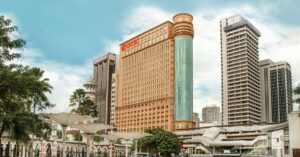KUALA LUMPUR: Malaysia’s booming data centre construction market is expected to see about eight major contracts worth RM13 billion-RM14 billion awarded by the first half of 2026.
This is in addition to five mechanical and electrical packages to be dished out during the period, according to industry analysts.
Over a longer period, the sector should continue expanding rapidly with a total capacity pipeline of five gigawatts (GW) by 2030. This translates into as much as US$30 billion worth of construction opportunities.
CIMB Securities analyst Kenny Mak Hoy Ken said the surge is driven by rising artificial intelligence (AI) and cloud computing demand, which is fuelling the development of large-scale 100–200 megawatt (MW) campuses.
He said the nation’s data centre market is projected to grow from US$4 billion in 2024 to US$13.6 billion by 2030, representing a compounded annual growth rate of 22.4 per cent.
“With a 5.0GW local data centre pipeline and US$6 million per MW construction cost, we estimate up to US$30 billion or RM126 billion worth of data centre projects for the local construction chain, as contract sizes for major data centres now range between RM1 billion and RM2 billion,” Mak said.
CIMB Securities named Gamuda Bhd, IJM Corp Bhd and Sunway Construction Group Bhd as among the frontrunners for the jobs. They collectively have led early turnkey and core and shell (C&S) data centre wins in Malaysia.
However, Mak noted that growing competition from European, Japanese and local-foreign joint ventures may challenge their dominance.
He added that greater localisation of C&S works would benefit M&E contractors and power distributors, particularly internal players that offer stronger margin resilience.
“Southern Score Builder Bhd, through its 51 per cent-owned SJEE Engineering, has already emerged as an early beneficiary of these contracts,” he said.
CIMB Securities also highlighted that Malaysia’s digital infrastructure providers stand to gain from rising data centre-related demand following the government’s RM2 billion allocation to the Malaysian Communications and Multimedia Commission (MCMC) under the 2026 Budget to establish a sovereign AI ecosystem.
“This initiative forms part of the broader RM5.9 billion national cloud policy,” said Mak.
He said Gamuda, through its joint venture Gamuda DNeX Cloud, holds a first-mover advantage in offering specialised air-gapped cloud infrastructure in Malaysia.
CIMB Securities retained Gamuda and IJM as its top infrastructure picks for exposure to Malaysia’s fast-growing data centre sector.
“Beyond being a frontrunner in data centre construction, Gamuda is also well positioned to benefit from the government’s national cloud policy ambitions,” Mak said.
Mak noted that Southern Score’s SJEE unit has secured multiple internal M&E packages from hyperscalers in Malaysia, including its largest-ever RM103 million electrical works contract awarded on Sept 2, 2025.
He expects established local M&E contractors to become preferred partners amid strong contract momentum in Malaysia’s turnkey data centre space.
Malaysia’s data centre boom to drive regional power demand
Separately, BMI, a unit of Fitch Solutions, said Malaysia has emerged one of Asia’s leading data centre growth markets alongside Indonesia and India, as regional expansion accelerates amid a data centre crunch in Singapore.
Johor has become a preferred destination to serve Singapore-based demand, supported by lower costs and land availability, the firm said.
BMI expects average data centre capacity growth of 9.7 per cent annually across the Asia Pacific region between 2025 and 2028, with Malaysia among the top performers.
“While Malaysia has been leading the region in data centre expansion, the pace of expansion is placing significant pressure on its land and power resources, including the grid,” it said.
BMI cautioned that this rapid increase could create a mismatch between power demand and generation growth, making it harder to meet new data centre needs with clean energy.
It said data centres accounted for about 20 per cent of Malaysia’s electricity output growth in 2024, but this could surge to between 70 and 90 per cent in 2025–2026 as new data centres come online.
While Malaysia continues to lead in the region, rising electricity tariffs for data centres and grid strain may prompt operators to consider nearby markets such as Thailand and the Philippines for expansion, BMI added.
© New Straits Times Press (M) Bhd






